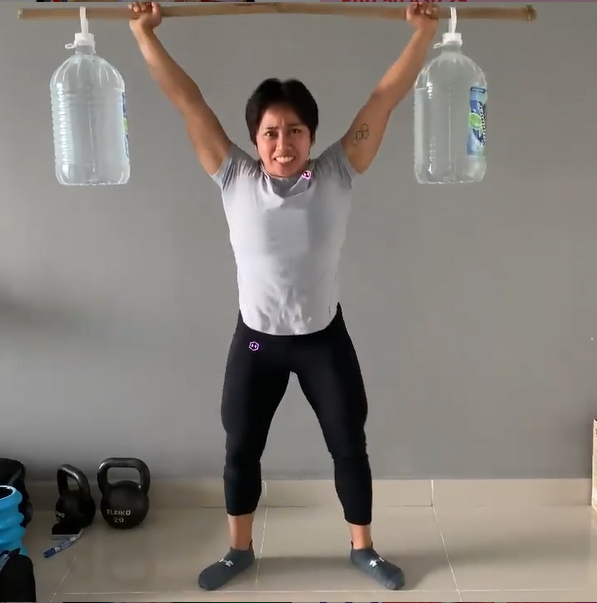After struggling with lockdown diet, Diaz says she’s okay now after learning to cook and doing cardio
Hidilyn Diaz was in a cheerful mood when asked about her weight and eating habits during the pandemic.
“I got big. My tummy got big,” she said in Filipino with a chuckle during a nutrition webinar held by the Philippine Olympic Committee on Saturday afternoon.
“I really thought I wasn’t eating that much,” she added. “Before the ‘movement control orders’ here, I wasn’t really paying attention to my meals.
Article continues after this advertisementDiaz, Philippine weightlifting’s poster girl and the country’s leading hope for an Olympic medal is stuck in Kuala Lumpur, Malaysia, as the new coronavirus disease (COVID-19) pandemic continues to freeze movement around the world.
There, Diaz was preparing for the World Asian Championships in Uzbekistan—the bemedaled athlete’s last stop for Olympic qualification.

Hidilyn Diaz flaunting her gold-winning lift in the 30th Southeast Asian Games last year. —SHERWIN VARDELEON
No equipment
Diaz used to have trouble with access to training equipment owing to Malaysia’s lockdown measures. But that, along with her bouts with food cravings, have now become a thing of the past.
Article continues after this advertisementNutrition coach Jeaneth Aro, who was also one of the webinar speakers, revealed that Diaz was fortunate to borrow plates, a lifting bar and a squat rack to continue training while in isolation. In her Instagram posts, Diaz has shown she could get creative in using makeshift equipment.
“Her training continues, because the last thing we want is for her gains in the last two years to all go to waste,” Aro said.
Better yet, Diaz has found it easy to deal with isolation.
“Isolation is easy for some of us athletes,” said Diaz in response to the Inquirer. “[We’re usually just on] a habit of eating, training and sleeping.”
The challenge Diaz faces are mostly the little things turned huge by the pandemic, like sourcing ingredients for her meals.
As an elite athlete, Diaz’s meals are tailor-made for her sport and she struggles with sustaining her protein intake and scouring for vegetables.
“Supermarkets usually have long queues,” she said. “But I’m adjusted now.”
Her team has also joined the trend of turning to online merchants for produce.

A screengrab of a video shot by a friend posted on Diaz’s Instagram account—shows the Filipino champion using makeshift equipment to train while in lockdown in Malaysia.
Interest in cooking
“We have vegetables for one week,” she said. “If we really need to buy something, Julius (Naranjo, her strength and conditioning coach, and partner) does it for us.”
Diaz also said she has taken interest in cooking, which has vastly helped her manage her eating habits.
“I actually cook now,” she said with a chuckle.
“I’ve been eating a lot because of stress. We’re just inside our rooms, so we tend to think about food,” she added. “So it’s important to watch our eating habits.”
And then there’s diversifying her workout regimen.
“Usually, I don’t run. You know weightlifters, they are not too fond of cardio [exercises],” she said.
“But now, I’m beginning to appreciate [doing cardio],” she said, stressing on the need to stay fit and well amid a global health crisis.
“The happiest thing for me right now, as an athlete, is that I’m able to train again,” said Diaz, the 2016 Rio de Janeiro Olympics silver medalist and 2018 Asian Games champion who also won a gold in last year’s Southeast Asian Games.
Also taking part in the webinar were swimming legend Akiko Thomson and boxing Olympic hopeful Nesthy Petecio, who understands the diet challenge Diaz went through.
“It’s hard to be disciplined in this situation,” said Petecio, currently the world women’s featherweight champion who is hoping to catch a wild-card bus to the Tokyo Olympics. “I’m alone in my house so when I crave for something to eat, I usually go and buy it. I just try my best to train while in isolation.”